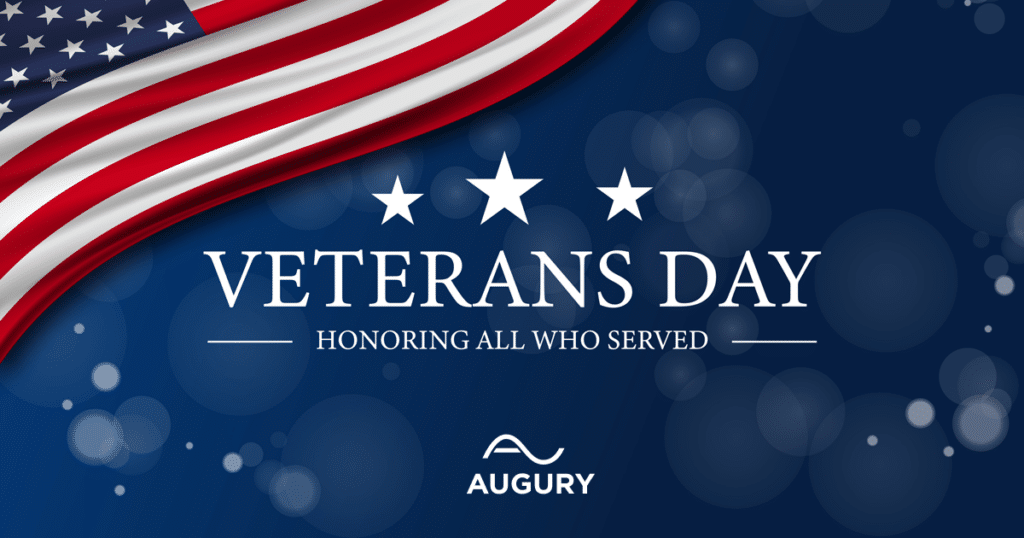
November 11 is Veterans Day in the United States. In honor of the holiday, we asked five Augury vets – James Newman, Brandon Jeffrey, Nhan Nguyen, Amber Logan, and Christopher Morrison – about their military experiences, how those experiences have impacted their professional pursuits, and how the manufacturing and technology industries could benefit from hiring more veterans.
Called to Serve
Augury: First, tell us about your military service – in which branch did you serve and what was your job there?
James: I served in the Army, Infantry 82nd Airborne Division. So I spent four years jumping out of what people thought were perfectly good airplanes. And those jumps were 11 seconds and 1,100 feet from the ground, not the cute ones where you float down and land on the football field.
Brandon: I served in the Marine Corps from 2004 to 2008 as a JTAC [Joint Terminal Attack Controller], also known as a Forward Observer. Lots of jumps, just like James – breaking ankles and busted knees-type jumps. Lots of bee stings.
Augury: Bee stings? Is that a military euphemism for something?
Brandon: No, no. I jumped into a beehive once.
Nhan: I served in the Navy from 2010 to 2014 on an aircraft carrier. My role was a little bit more technical. I was an electrician and did very hands-on things, like rewinding motors. I joined right out of high school, so my journey in the technical stuff started really early.
Amber: I started my military career in the Army National Guard as a cook and worked my way up to Mess Sergeant. When my brigade was activated to deploy to Afghanistan I was asked to fill a human resources position and I accepted the challenge. I enjoyed the day to day Army life and ended up going between Active and National Guard until I completed my 20 years of service.
Christopher: I served in the United States Marine Corps for five and a half years as a Telephone Systems Personal Computer Intermediate Repair man – or comm tech for short.
Finding Mission-Driven Careers
Augury: How did your military service impact your career direction, or how did it impact how you approach your job?
James: For me, the military didn’t set me up for my career, but it set me up for being good at my career. It was all about learning how to suck it up on the bad days. Being able to say, today sucks, tomorrow’s probably gonna suck, but this is the job and I got to get it done.
But before that, I was the guy on my block with the first computer, ripping it apart to figure out how I could rebuild it and make it faster. So nobody would be surprised that I’m working in tech. My degrees are in nuclear engineering, so they might be surprised I don’t do that anymore, as much as I still love it, but it’s no surprise to anyone that I’m involved in the principles of technology and mechanics.
Christopher: For me, serving was a duty, following in my father and older brother’s footsteps. I joined shortly after September 11, 2001.
In the service, the ability to move, think, and adjust very rapidly is vital, and that’s really important in my current role. Nothing is ever 100% set and laid out for you – you have to trust in yourself and your team to tackle the hard problems. That applies to personal interactions, too. I have to meet new customers and contractors and work together to solve problems. Having a background in handling stressful situations makes it easier to think clearly and make the right decision. And own it, no matter what – failures and successes.
Amber: My military experience has helped so much throughout my career in terms of leadership skills, working in teams, work ethic, and especially with handling difficult situations. But it’s there in small ways, too – organizational skills, thinking through problems, planning and executing my projects. I think veterans bring so much value to companies because of our core values – our commitment, integrity, accountability, loyalty, and service before self. We do what it takes to get the job done.
Nhan: I joined the Navy as an electrician, so my job was very technical. But you also get put into spots like being flown off the aircraft carrier to fix a rotor on a sister ship where you’re everything–you’re the rigging team, the installation team, the repair team. You’re ingrained with the idea that the mission is always first. We’re gonna run to the problem, we’re not going to run away from it.
Brandon: That’s right. When you have a job in the military you have 10 million other jobs. My first deployment in Fallujah was very IED heavy so I got selected as a subject matter expert to learn electronics warfare. That bridged the gap for me with working in tech.
I didn’t talk to any other branch, only the Marines, because I wanted to do the hardest thing. What’s bred into you from day one in the Marines is that you’re the absolute best, which set me up for the work ethic. In the service, I had no idea I’d be working for an AI company that does predictive maintenance. But the reason I did was for the challenge. It’s the exact same mindset – taking on hard things.
Augury: Was there anything specific about Augury that appealed to you as vets?
Christopher: Augury was a great fit for me because I was already accustomed to working with tight-knit teams and working toward a mission. There’s nothing like walking away from a client site after a successful install – it’s a really good feeling.
James: Totally agree. Being in the military teaches you how to work in a team differently than anywhere else. You have your job, and your role to play, but the most important role is that other people depend on you.
A nice thing about being an American vet working for Augury is that almost everybody we interact with on the Israeli side is also a vet. It’s an interesting dynamic. So my boss was military and he jumped out of airplanes. He shares that experience. Our CEO is a vet. They kind of get it, right, and we all understand the commitment and the drive toward the mission.
Brandon: We work in reliability, right, and – not that this isn’t true for civilians – but I guarantee that if I need something I could call any veteran 24/7 and they’ll answer the phone. We’re used to new stuff just being thrown at us and having to figure it out. And that applies to working with customers, too, figuring out complicated projects and helping them understand what their objective is and bridging that with technology. Veterans are used to thinking outside the box and getting creative. And I love helping people, and that’s Augury’s mission. It really resonated with me.
Bringing More Vets to Tech and Manufacturing
Augury: What do you think manufacturers and tech companies can do to attract and retain more talented vets?
Amber: I’d love to see them broaden their recruiting strategies to include military job posting boards and build a brand within the military community.
Christopher: Veterans are self-motivated and very well-disciplined already. It’s less about motivating them and more about not de-motivating them. Veterans, especially combat veterans, can take a lot more punishment, and they take pride in working hard. If you give a veteran the plan on what you need to be done, let them go do it, and don’t micromanage how they get done what you asked of them.
Nhan: Having a clear mission, something people can get behind. We really see every day how we’re delivering value to our customers. And seeing that keeps you engaged because you’re seeing results.
James: I think that’s important. I don’t like being aimless, vets don’t like being aimless. So manufacturers should keep that at the forefront – this is where we’re going, these are the objectives we need to meet, and I’m going to take you there and show you how your contribution matters.






